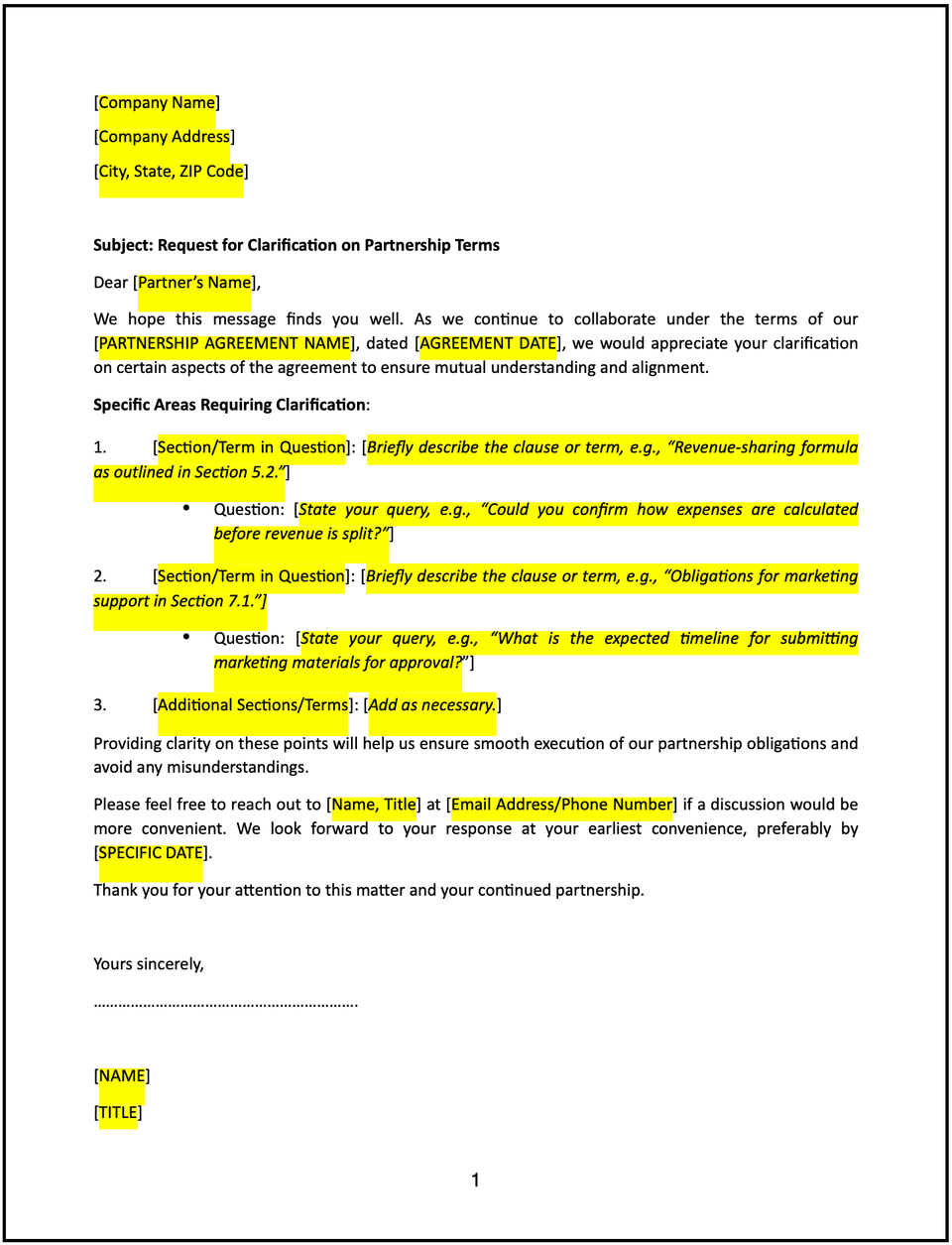Letter of request for clarification on partnership terms: Free template

Letter of request for clarification on partnership terms
A letter of request for clarification on partnership terms is a formal communication used to seek further details or resolve ambiguities regarding the terms of a partnership agreement. This letter ensures clear understanding between parties, avoids potential misunderstandings, and fosters a cooperative relationship.
How to use this letter of request for clarification on partnership terms
- Open with an introduction: Address the recipient respectfully and reference the partnership agreement or prior discussions.
- State the purpose: Clearly communicate your request for clarification on specific terms or provisions of the agreement.
- Specify the areas of concern: Identify the sections or terms in question, providing enough context for the recipient to understand the request.
- Explain the need for clarification: Briefly describe why the clarification is important for compliance, implementation, or mutual understanding.
- Request a response: Politely ask the recipient to provide further details, explanations, or examples regarding the terms in question.
- Offer collaboration: Indicate your willingness to discuss the matter further or propose adjustments if necessary.
- Maintain a professional tone: Ensure the letter is clear, respectful, and focused on resolving the issue constructively.
- Provide contact information: Include details for the recipient to reach out with their response or schedule a discussion.
Benefits of using a letter of request for clarification on partnership terms
This letter ensures a structured and professional way to address ambiguities while fostering clarity and collaboration. Here’s how it helps:
- Promotes understanding: Requesting clarification ensures all parties interpret the terms consistently.
- Reflects professionalism: A well-crafted letter demonstrates respect and attention to detail.
- Prevents disputes: Addressing potential misunderstandings early avoids future conflicts or confusion.
- Encourages collaboration: Politely requesting input fosters a cooperative relationship.
- Enhances compliance: Clear understanding of terms ensures alignment with contractual obligations.
Tips for writing an effective letter of request for clarification on partnership terms
- Be specific: Clearly identify the terms or sections needing clarification, providing sufficient context.
- Use professional language: Maintain a respectful and constructive tone to encourage a cooperative response.
- Provide context: Briefly explain why the clarification is important to the partnership’s success.
- Highlight mutual benefits: Emphasize that resolving ambiguities benefits both parties.
- Include actionable steps: Share instructions for providing clarification or scheduling a meeting to discuss further.
- Keep it concise: Focus on the key points while ensuring the tone is professional and solution-oriented.
Frequently asked questions (FAQs)
Q: What details should I include in this letter?
A: Include references to the partnership agreement, the specific terms in question, and a polite request for clarification.
Q: Should I personalize the letter?
A: Yes, addressing the recipient by name and referencing prior discussions demonstrates attentiveness and professionalism.
Q: Who typically sends this letter?
A: Business leaders, legal representatives, or partnership managers typically send this letter.
Q: How formal should this letter be?
A: The tone should be professional and respectful, focusing on fostering understanding and collaboration.
Q: When should this letter be sent?
A: Send the letter as soon as ambiguities or uncertainties are identified to avoid delays or conflicts.
Q: Can this letter suggest potential solutions or adjustments?
A: Yes, proposing ideas can help streamline discussions and foster a collaborative resolution.
Q: Is acknowledgment from the recipient required?
A: While not mandatory, requesting acknowledgment ensures the recipient has reviewed the request and is addressing it.
This article contains general legal information and does not contain legal advice. Cobrief is not a law firm or a substitute for an attorney or law firm. The law is complex and changes often. For legal advice, please ask a lawyer.


